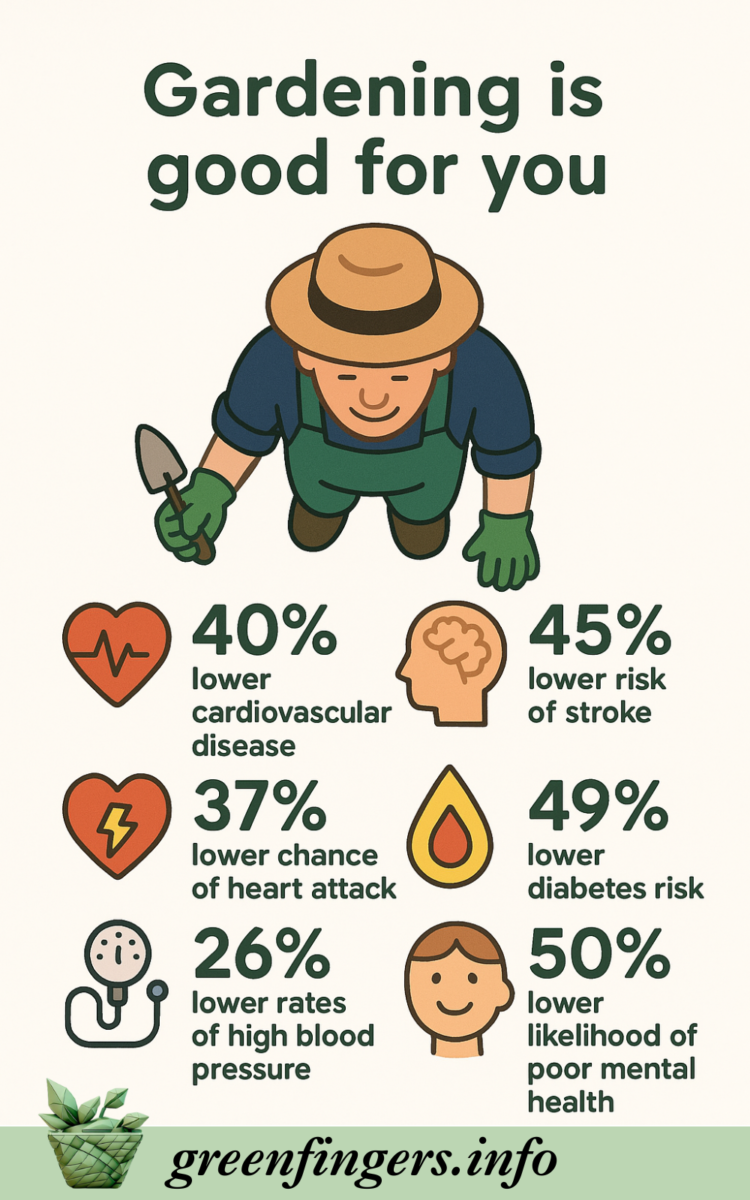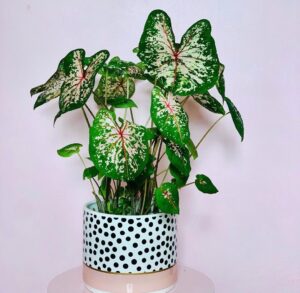
Gardening, long considered a peaceful hobby, may be one of the most powerful health interventions available, according to groundbreaking new research that shows it could lead to longer life and significantly lower disease risks in gardeners – in some cases surpassing the benefits of traditional exercise.
A comprehensive 2019 BRFSS Survey, published in a peer-reviewed medical journal, reveals that gardeners have substantially lower rates of cardiovascular disease, stroke, diabetes, and other chronic conditions compared to both non-exercisers and those who engage in other forms of physical activity.
“What’s particularly striking is that gardening appears to have unique benefits that even regular exercise doesn’t provide,” says Dr. Susan Veldheer, lead researcher of the BRFSS study. “For example, both male and female gardeners showed significantly lower diabetes risk compared to traditional exercisers.”

The research, which examined health outcomes among 146,047 adults aged 65 and older, found that gardeners had:
- 40% lower odds of cardiovascular disease
- 45% lower risk of stroke
- 37% lower chance of heart attack
- 49% lower diabetes risk
- 26% lower rates of high blood pressure
- 50% lower likelihood of poor mental health
Additionally, a separate umbrella review analyzing four decades of scientific literature from the University of Agricultural Sciences and King’s College London documented a remarkable 55% increase in general well-being measures among gardening participants.
In this article
The science behind the benefits
“Gardening is what we call a ‘multicomponent intervention,'” explains Dr. Martha Wadsworth, co-author of the research. “It combines physical activity, exposure to nature, goal-oriented tasks, and often social interaction – creating a powerful cocktail of health benefits.”
The activity’s unique combination of movements – gripping, bending, crouching, and twisting – helps maintain functional mobility in aging populations. But the benefits extend far beyond physical health.
Dr. Lawrence Sinoway, a cardiovascular specialist involved in the research, notes that gardening’s mental health benefits are equally impressive. “We’re seeing reduced cortisol levels, improved attention spans, and enhanced emotional regulation among gardeners. The mindfulness aspect of tending to plants appears to build significant emotional resilience.”
Unexpected nutritional advantages
The studies also revealed that gardeners are more likely to consume the recommended daily servings of fruits and vegetables, potentially contributing to their improved health outcomes. Researchers found gardeners had 56% higher odds of consuming five or more servings of fruits and vegetables daily compared to non-gardeners.
“Growing your own food creates a direct connection to nutrition,” explains nutritionist Dr. Sarah Chen, who wasn’t involved in the study but specializes in dietary behavior. “When people invest time and effort into growing vegetables, they’re more likely to incorporate them into their meals. It’s about both accessibility and emotional investment in healthy eating.”
Microbiological exposure and immune system
Recent research has also highlighted another unexpected benefit of gardening: exposure to beneficial soil microorganisms. Dr. Christopher Thompson, a microbiologist at the University of California, explains, “Contact with soil bacteria can help regulate our immune system and reduce inflammation. This might partially explain why gardeners show lower rates of certain chronic diseases.”
Social and community impact
The community aspect of gardening shouldn’t be underestimated, according to social psychologist Dr. Rachel Martinez. “Community gardens, in particular, create social bonds and support networks that contribute to mental health and longevity. We’ve observed that gardeners often develop strong social connections through shared interests and activities.”
Practical applications
Dr. Kathryn H. Schmitz, a public health expert, emphasizes the practical implications of these findings. “What’s particularly exciting is that gardening is accessible, low-cost, and can be adapted to almost any physical ability level. It could be a game-changer for public health initiatives.”
The research team suggests that healthcare providers might consider “prescribing” gardening as a preventive health measure, particularly for older adults at risk for chronic diseases.
“The evidence is compelling enough that we should seriously consider integrating gardening programs into healthcare and community wellness initiatives,” says Dr. Christopher Sciamanna, who contributed to the research. “The combination of physical activity, mental health benefits, and improved nutrition makes it an incredibly efficient intervention.”
Getting started with therapeutic gardening
For those interested in starting, experts recommend:
- Beginning with container gardening if space is limited
- Joining community garden programs for social interaction
- Using raised beds to reduce physical strain
- Starting small and gradually expanding
- Focusing on easy-to-grow vegetables or flowers
Adapting gardening for all abilities
Physical therapist Dr. Linda Roberts offers specific recommendations for different ability levels:
For those with limited mobility:
- Use vertical gardening systems
- Implement tabletop gardens
- Utilize long-handled tools
- Install wheelchair-accessible paths
- Consider hydroponic systems
For seniors:
- Create sitting areas throughout the garden
- Use lightweight tools
- Plan for shade during peak sun hours
- Install good lighting for evening gardening
- Keep emergency communication devices nearby
Year-round benefits
While outdoor gardening might seem seasonal, experts emphasize that the benefits can be maintained year-round. “Indoor gardening, greenhouse activities, and winter planning all contribute to maintaining the positive effects,” explains horticultural therapist Jennifer Woods. “The key is staying engaged with some form of gardening activity throughout the year.”
Future research directions
As research continues to unveil the health benefits of gardening, scientists are now exploring more specific aspects of this activity. “We’re particularly interested in understanding which types of gardening activities provide the most benefit,” says Dr. Veldheer. “We’re also investigating whether different plants might have varying effects on well-being.”
Current studies are examining:
- The impact of soil microbiome exposure on immune function
- Optimal duration and frequency of gardening sessions
- Effects of different types of plants on mental health
- Role of gardening in rehabilitation programs
- Potential benefits for specific medical conditions
As research continues to unveil the health benefits of gardening, this age-old activity appears to be more than just a peaceful pastime – it could be one of the most effective ways to promote healthy aging and longevity. With its combination of physical activity, mental stimulation, social interaction, and natural exposure, gardening offers a holistic approach to health that few other activities can match.
References:
Gardening Really Is Good for You, Science Confirms, ZME Science, April 5 2025
Gardening is Associated with Better Cardiovascular Health Status Among Older Adults in the US: Analysis of the 2019 Behavioral Risk Factor Surveillance System (BRFSS) Survey, PubMed, Dec 27 2023
RELATED READING: The Extensive Mental Health Benefits of Indoor Gardening







